When it comes to teens and screen time, it’s debated how much screen time is too much. According to a PEW survey, 95 percent of teens have access to a smart phone, and almost half of them say they’re online constantly. According to the study, it’s not just parents who are concerned about their kids spending too much time onscreen. Over half of teens ages 13 to 17 are worried that they are spending too much time on their phones themselves. Experts say it will take parents and their kids working together to find the right balance and that there are signs parents can look for that may indicate its time to intervene.
“If a child is spending more time online than they have been in the past. If they seem to be secretive about what they’re doing online than spending time with friends in real life,” said Pam Clasgens, Community Awareness & Prevention Director at the National Children’s Advocacy Center. “Maybe they seem withdrawn, sad, or angry or hurt or they seem obsessed with looking at things online.”
Parents can work with their teens on coming up with a media plan– they can ask their teens to look at their school and extracurricular schedules and then choose time outside of that to spend on their screens. For tougher cases that may involve addictive screen behavior, parents may want to consider cutting off their teen’s cell phone use completely to help cut off the habit– experts say as much as a month without phones.
One of the best thing parents can do to promote healthy and balanced screen time for their kids– according to experts– is to communicate– not only about the sites kids are visiting and how much time they’re spending on them– but also about online relationships.
“As parents, we can be talking to our kids all the time about healthy relationships,” said Clasgens. “That can be dating relationships, friendships, it can be offline, online. We need to be talking to our kids all the time about what that means in the context of relationships– how do we treat other people, and how we treat other people with kindness and respect and empathy, so that we are never doing anything to anyone else that’s harmful or could exploit them in any way.”
RELATED: More Cybersafe information
The American Academy of Pediatrics has a tool to help families come up with a customized media plan: https://www.healthychildren.org/English/media/Pages/default.aspx
Cybersafe Parent tips:

